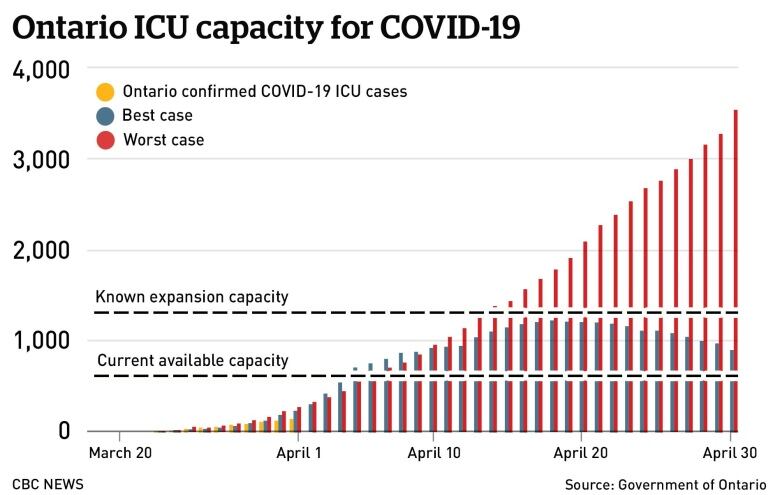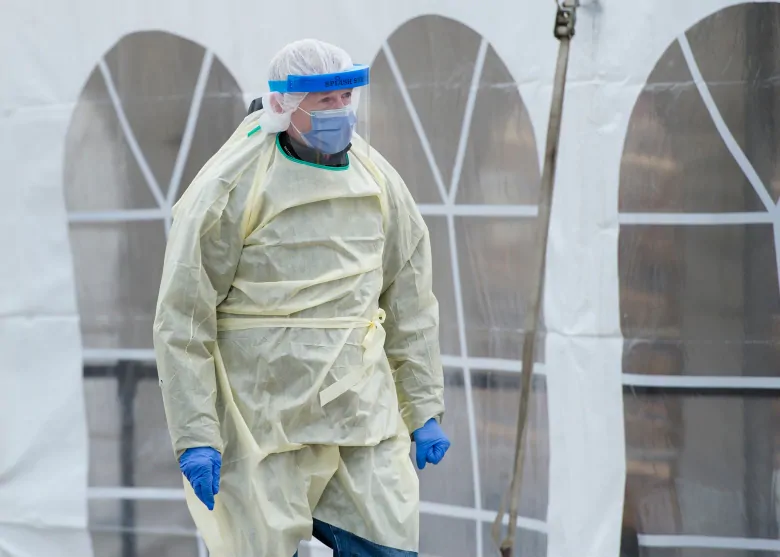With just over 12,500 cases of COVID-19 reported across Canada, including 219 deaths, Prime Minister Justin Trudeau is expected to announce more financial support Saturday aimed at helping the most vulnerable Canadians cope with the pandemic.
CBC News Network showcases the best of CBC journalism, covering breaking stories with speed, and adding context and meaning along the way. CBC News Network is also the destination for original journalism, with added depth from CBC News bureaus across the country and around the world. 0:00
The latest:
- China holds day of mourning to honour those who died of COVID-19.
- 3M faces pressure from Trump to stop exporting N95 masks to Canada.
- ANALYSIS: Why we need to hear about Ontario’s COVID-19 projections.
- Mounting evidence of COVID-19 ‘silent spreaders’ contradicts government’s earlier messages.
- Food security experts warn of supply shortages, higher prices due to pandemic.
- 5 myths about preventing, detecting COVID-19.
- Canadian passengers on virus-stricken Coral Princess cruise ship worry how they’ll get home.
- INTERACTIVE | See the latest data on COVID-19 cases in Canada.
With just over 12,500 cases of COVID-19 reported across Canada, including 219 deaths, Prime Minister Justin Trudeau is expected to announce more financial support Saturday aimed at helping the most vulnerable Canadians cope with the pandemic.
The new announcement follows Friday’s commitment of $100 million for organizations that help get food to Canadians who can’t afford groceries or who have uncertain access to food and other basic necessities in remote northern regions.
People who are already food insecure are going to see their situation worsen because of an expected increase in supply shortages, said Elaine Power, a food security expert at Queen’s University.
Global cases of the novel coronavirus have shot past one million with more than 54,000 fatalities, a Reuters tally showed on Friday.
The pandemic has also brought the global economy to a standstill and plunged the world into a recession that will be “way worse” than the global financial crisis a decade ago, the head of the International Monetary Fund said on Friday.
- How will the global coronavirus pandemic end?
- INTERACTIVE | How Canada compares with other countries at flattening the curve
Global stock markets sank on Friday following another sign the pandemic would take a huge toll on economic growth. The U.S. economy shed 701,000 jobs in March, ending a historic 113 straight months of employment growth, while U.S. Senate Majority Leader Mitch McConnell said Congress will work on another relief bill, with health care topping the list of priorities.
WATCH | How some businesses are adjusting to COVID-19:
Rocco Rossi, president and CEO of the Ontario Chamber of Commerce, talks to CBC. 5:46
Also on Friday, Ontario released its provincial projection and modelling information related to the pandemic, with Premier Doug Ford saying that he wants the province’s residents to know “what I know.”
The modelling projects the coronavirus crisis could last 18 months to two years and kill 3,000 to 15,000 people, even with public health measures in place.
WATCH | Public Health Ontario head projects between 3,000 and 15,000 deaths over pandemic’s full course:
The best case scenario for the number of COVID-19 related deaths in Ontario is 3,000-15,000 over the full course of the pandemic, says Dr. Peter Donnelly, the CEO of Public Health Ontario. 2:56
“Had we done nothing, Ontario may have suffered 100,000 deaths,” said Public Health Ontario CEO Peter Donnelly, referencing the province’s physical distancing and other measures.
- Why COVID-19 has personal support workers feeling uneasy during home-care visits
- ICU doctor preaches positivity in the face of COVID-19
Three of Atlantic Canada’s four provinces say they will attempt to provide COVID-19 modelling projections sometime next week. Nova Scotia, New Brunswick and P.E.I. all say they will provide numbers, although Newfoundland and Labrador says it doesn’t have sufficient data to do so.
WATCH | Trudeau talks about controversy around cross-border flow of critical supplies:
Prime Minister Justin Trudeau reacts to the news that the Trump administration has ordered a major manufacturer 3M to stop exporting N95 masks to Canada. 1:43
At his daily briefing on the pandemic, Trudeau will likely also face more questions about U.S. President Donald Trump’s request that Minnesota-based 3M stop supplying N95 respirator masks to Canada and Latin America. Trump wants the masks, which are critical to protect frontline health-care workers, reserved strictly for American use.
Trudeau said the federal government was making the point “very clearly” to the Trump administration that it is critical not to disrupt the two-way flow of essential goods and services — including Canadian health care professionals who work in American hospitals — that cross the border every day.
- CBC EXPLAINS | What you need to know about the new COVID-19 emergency wage subsidy
- Trump says government recommends non-medical face masks but he won’t wear one.
Trudeau also said Friday that the Canadian Armed Forces will assist in northern Quebec to help prevent the spread of COVID-19 in isolated communities, at the provincial government’s request. The Rangers, which are part of the Canadian Armed Forces Reserve and provide a Canadian Armed Forces presence in northern and isolated communities, will help set up tents and other medical equipment, as required by the communities.
For most people, the coronavirus causes mild or moderate symptoms, such as fever and cough. But for others, especially older adults and people with health problems, it can cause severe symptoms like pneumonia. The Public Health Agency of Canada (PHAC) says the situation is evolving daily but that the risk to Canadians from COVID-19 is “considered high.”
Here’s a look at what’s happening in Canada, the U.S. and around the world.
Here’s a look at what’s happening in the provinces and territories
As of midnight ET on Friday, Canada has 12,549 confirmed and presumptive cases, with 219 deaths. The provinces and territories that list information about recovered cases have reported 2,296 cases as resolved or recovered. There have also been two reported COVID-19-related deaths of Canadians abroad — one in Japan and one in Brazil.
Public health officials caution that reported case numbers don’t provide a complete picture of the scale of the outbreak as that data doesn’t capture people who haven’t been tested and cases that are still under investigation. Dr. Theresa Tam, Canada’s chief public health officer, has urged people nationwide to practise physical distancing and behave as though there is COVID-19 in their community, even if there is no known case.
- To see how things break down in your province, visit the CBC’s COVID-19 case tracker. Want to learn more about what the daily data means? Here’s how to make sense of the coronavirus numbers.
In British Columbia, provincial health officer Dr. Bonnie Henry on Friday announced that the number of people hospitalized with the novel coronavirus had actually dropped by three to 146. In the same time period, four COVID-19 patients died, bringing the province’s total to 35 so far. Read more about what’s happening in B.C.
BC Ferries says service reductions will go into effect beginning Saturday on major ferry routes for 60 days, including the Horseshoe Bay-Departure Bay route between West Vancouver and Nanaimo, B.C.

Alberta has declared coronavirus outbreaks at nine seniors’ facilities. Dr. Deena Hinshaw, the province’s chief medical officer of health, said there are now 74 confirmed COVID-19 cases in continuing-care facilities “and I expect that more will be confirmed in the coming days.” The province reported five more people have died. That brings the death toll to 18, and the total number of cases to 1,075. Read more about what’s happening in Alberta.
In Saskatchewan, the head of the province’s nurses union says health officials are looking at “new and creative ways” for medical workers to use face masks. Tracy Zambory says the Saskatchewan Health Authority will have to first conduct trials to make sure the practice is safe in hospitals where PPE (personal protective equipment) is already being rationed. Read more about what’s happening in Saskatchewan, and the story of a Saskatchewan man living in New York who has helped get N95 masks into the hands of health-care professionals in that city.
WATCH | Paramedic describes front-line fight against COVID-19:
Iggy Chan says coronavirus has made his job more dangerous because he is fighting an ‘invisible’ enemy. 4:41
In Manitoba, unions representing Health Sciences Centre workers say at least 70 staff members — including doctors, nurses, clerks and security guards — are self-isolating after COVID-19 exposures. Read more about what’s happening at the Winnipeg health facility and across Manitoba.
Ontario reported 462 new cases of COVID-19 on Friday. The province now has a total of 3,255 reported cases, of which 1,023 are listed as resolved. The province’s case tally puts the COVID-19 death toll at 67. But based on our own reporting and after gathering data from local public health units, CBC News has counted 97 deaths in the province.

The announcement of the new figures came just hours before health experts released projections for how the COVID-19 outbreak could unfold in the province.
- Some internationally trained doctors can apply for 30-day Ontario licence to fight COVID-19
- Have masks and gloves to spare? New website will get them into the hands of health-care workers in Quebec
- ANALYSIS: Why we need to hear about Ontario’s COVID-19 projections
Quebec’s premier said health-care workers who are in contact with COVID-19 cases will get an increase in pay. “I don’t think there is a group that has ever been more deserving of a pay raise,” said Premier François Legault, who also announced a smaller raise for health workers not in direct contact with the virus, as well as a raise for workers in long-term care facilities. Read more about what’s happening across Quebec, and get the details of the planned pay hikes.

Health officials in New Brunswick are worried about a potential shortage of COVID-19 test supplies. Premier Blaine Higgs told CBC’s Power & Politics if the province “ramped up a bit we could be within like a week of running out of test supplies.” Read more about what’s happening in N.B.
Nova Scotia on Thursday extended its state of emergency for another two weeks. The province also announced help for small businesses and a temporary program to help workers who don’t qualify for employment insurance. Read more about what’s happening in Nova Scotia.

Prince Edward Island has announced a $1-million fund to help people not covered by other support programs announced since the COVID-19 crisis began. Read more about what’s happening on P.E.I, and get the latest update from Premier Dennis King.
WATCH | What the COVID-19 pandemic looks like across Canada
A look at how different provinces are handling the COVID-19 pandemic and how the numbers vary. 4:46
Newfoundland and Labrador’s health minister is urging people to prepare for an increase in cases. “We are, from experience of our other jurisdictions, not yet into our likely surge period. This is likely to come over coming weeks, and we are working hard to understand when that might be,” John Haggie said. Read more about what’s happening in N.

